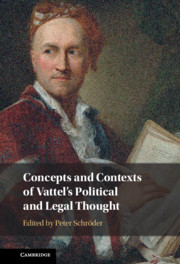Book contents
- Concepts and Contexts of Vattel’s Political and Legal Thought
- Concepts and Contexts of Vattel’s Political and Legal Thought
- Copyright page
- Contents
- Contributors
- Acknowledgements
- Concepts and Contexts of Vattel’s Political and Legal Thought
- Part I Historical and Intellectual Contexts
- 1 In Search of a Nation
- 2 Sovereignty Contested
- 3 The Development of the Law of Nations
- 4 Vattel and the Abbé de Choisy
- 5 Vattel and the Seven Years’ War
- Part II Concepts
- Part III Receptions
- Index
- References
5 - Vattel and the Seven Years’ War
from Part I - Historical and Intellectual Contexts
Published online by Cambridge University Press: 11 June 2021
- Concepts and Contexts of Vattel’s Political and Legal Thought
- Concepts and Contexts of Vattel’s Political and Legal Thought
- Copyright page
- Contents
- Contributors
- Acknowledgements
- Concepts and Contexts of Vattel’s Political and Legal Thought
- Part I Historical and Intellectual Contexts
- 1 In Search of a Nation
- 2 Sovereignty Contested
- 3 The Development of the Law of Nations
- 4 Vattel and the Abbé de Choisy
- 5 Vattel and the Seven Years’ War
- Part II Concepts
- Part III Receptions
- Index
- References
Summary
Vattel’s Law of Nations appeared in the midst of the Seven Years’ War. Vattel’s lasting fame was, however, not an instant effect of the initial reception of his main work as the Law of Nations spread throughout Europe on a much larger scale after its second enlarged edition was posthumously published in 1773. The context of the Seven Years’ War is nonetheless important. To understand the Law of Nations and its enduring legacy and influence on international law, constitutionalism and political thought, its immediate reception as well as its proximity to the mechanisms of diplomacy, war and peace need to be taken into account. By assessing the Law of Nations in the context of the Seven Years’ War and along with other sources of the time, Vattel’s position towards contemporary French, Prussian and British politics can be reconstructed.
- Type
- Chapter
- Information
- Concepts and Contexts of Vattel's Political and Legal Thought , pp. 101 - 120Publisher: Cambridge University PressPrint publication year: 2021



